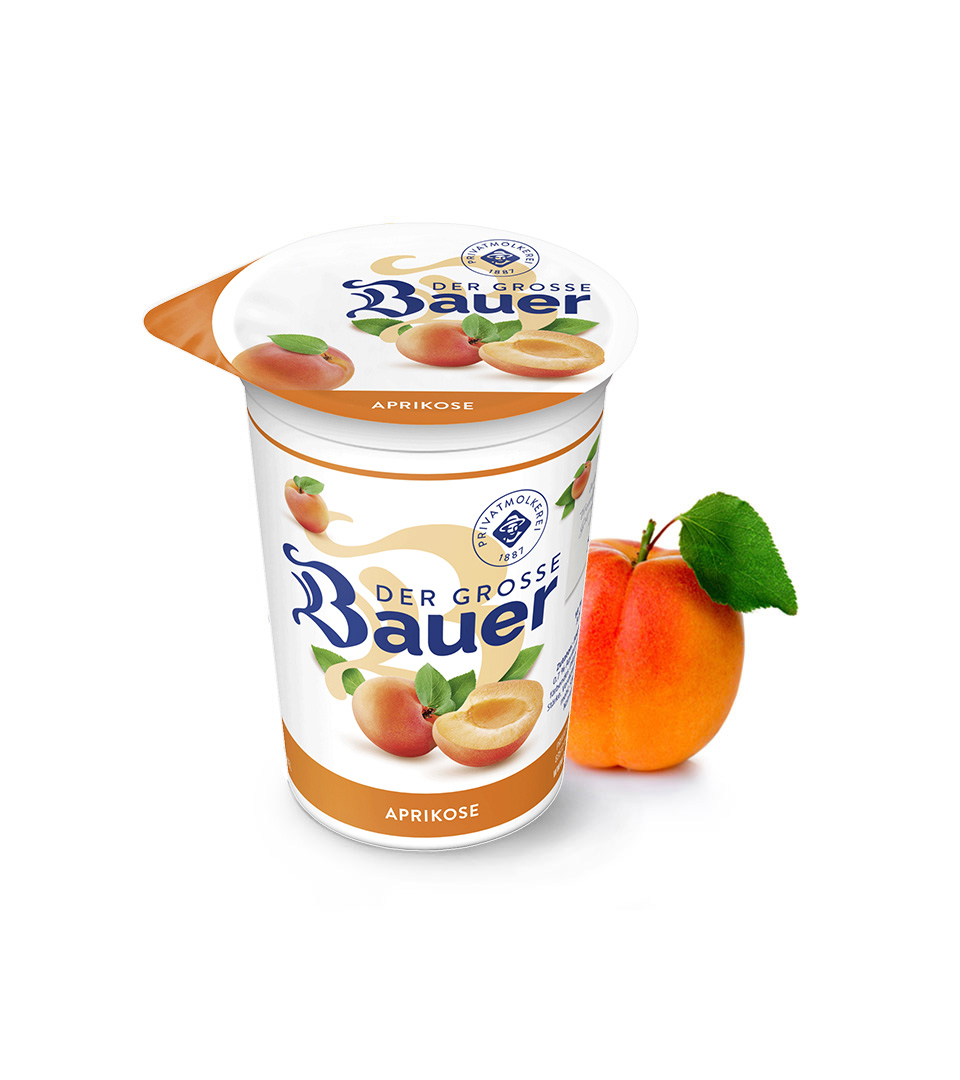
THE CLASSIC INDULGENCE
DER GROSSE BAUER APRICOT
Our popular fruit yoghurt is made from Bavarian milk containing 3.5% fat in the milk portion plus fresh fruit, and it is free of gelatine or preservatives. This big helping of fruit yoghurt is available in many flavours – from fruity strawberry all the way to the exotic flavour pineapple-coconut.
Yoghurt: 250g
| Average values | 100g each |
|---|---|
| Calorific value (kcal / kJ) | 87/368 |
| Fat (g) | 2,9 |
| Total Fatty acids (g) | 2,0 |
| Carbohydrates (g) | 12,2 |
| Sugar (g) | 11,5 |
| Protein (g) | 3,2 |
| Salt (g) | 0,05 |
SEEDS OF THE SUN
TASTES LIKE SUMMER!
Apricots made their way from Central Asia to Persia and Armenia in the 1st century BC. They were celebrated there as "seeds of the sun." The Macedonian King Alexander the Great brought apricots to Asia Minor and Greece around 330 BC. The fruit arrived in Europe at a later time, thanks to the Romans.
An apricot tree can grow up to five meters tall, with large light pink to white blossoms that grow directly on the trunk and branches. The fruits are yellow to orange-red with orange flesh. The skin is velvety and becomes soft only when the fruit is fully ripe. Anyone who has bitten into a sun-ripened apricot quickly becomes enamored: it tastes sweet, juicy, simply like summer, and is incredibly versatile.
APRICOTS HAVE LOW ACIDITY
THERE ARE MORE THAN 40 VARIETIES OF APRICOTS
In several respects, apricots are ahead of the game when it comes to their nutritional content. They contain little acid, many minerals and dietary fibers, a high amount of carotene (plant pigments), and an above-average amount of potassium. Apricots also contain vitamin B5 and folic acid in a beneficial combination. They strengthen the immune system and enhance concentration.
Additionally, they have a protective effect on the lung mucosa and can help alleviate asthma symptoms. Apricots are classified as stone fruits because they contain large stones inside. The kernels within these stones can be bitter or sweet and are often used as a substitute for almonds.
THE APRICOT
THIS FRUIT IS A MIDSUMMER NIGHT'S DREAM
Here’s a bit more about the history of the apricot. Europeans long believed it to be an aphrodisiac. In this context, it appears in literature, such as in John Webster’s "The Duchess of Malfi" and William Shakespeare’s "A Midsummer Night’s Dream." In the latter, Titania, the queen of the fairies, instructs her attendants to feed the weaver Nick Bottom apricots to kindle his love for her: "Be kind and courteous to this gentleman. Hop in his walks and gambol in his eyes. Feed him with apricots and dewberries." In China, the apricot symbolizes both female beauty and the desire for children. But honestly, those who buy "Der Große Bauer Aprikose" mainly have a craving for delicious yogurt.
More Products
FRUIT – 250 G

DER GROSSE BAUER
Strawberry

DER GROSSE BAUER
Raspberry

DER GROSSE BAUER
Blueberry-Cassis

DER GROSSE BAUER
Cherry

DER GROSSE BAUER
Banana

DER GROSSE BAUER
Peach-Passion Fruit

DER GROSSE BAUER
Bourbon Vanilla

DER GROSSE BAUER
Pear

DER GROSSE BAUER
Pineapple-Coconut

DER GROSSE BAUER
Mango-Lychee

DER GROSSE BAUER
Apricot

DER GROSSE BAUER
Strawberry-Chocolate Strips

DER GROSSE BAUER
Stracciatella

DER GROSSE BAUER
Banana-Chocolate Balls

DER GROSSE BAUER
Vanilla-Chocolate Balls

DER GROSSE BAUER
Lemon

DER GROSSE BAUER
Mango

DER GROSSE BAUER
Cherry-Banana

DER GROSSE BAUER
Bircher Muesli

DER GROSSE BAUER
Strawberry Muesli

DER GROSSE BAUER
Chocolate Muesli

DER GROSSE BAUER
Strawberry

DER GROSSE BAUER
Rhubarb-Vanilla

DER GROSSE BAUER
Blood Orange-Acerola

DER GROSSE BAUER
Mango-Passion Fruit

DER GROSSE BAUER
Strawberry

DER GROSSE BAUER
Apricot

DER GROSSE BAUER
Peach-Passion Fruit

DER GROSSE BAUER
Cherry

DER GROSSE BAUER
Apple-Strudel

DER GROSSE BAUER
Mandarin Cake

DER GROSSE BAUER
Plum-Cinnamon

DER GROSSE BAUER
Vanillekipferl

DER GROSSE BAUER
Lemon Cheesecake

DER GROSSE BAUER
Erdbeere-Rhabarber

